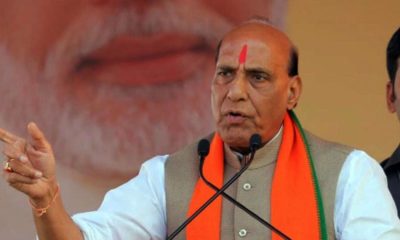Feature
SC extends Subrata’s parole if he deposits Rs.200 crore
 New Delhi: In a relief that has eluded Sahara chief Subrata Roy for over two years, the Supreme Court on Wednesday extended his parole till July 11, if he promises to deposit Rs.200 crore with market regulator SEBI by then.
New Delhi: In a relief that has eluded Sahara chief Subrata Roy for over two years, the Supreme Court on Wednesday extended his parole till July 11, if he promises to deposit Rs.200 crore with market regulator SEBI by then.
The top court had on May 6 granted four weeks of parole to the jailed Roy and his son-in-law Ashok Roy Choudhary to attend the last rites of his mother who passed away on the night of May 5.
Giving one more chance to Roy to prove his credentials, the apex court bench of Chief Justice T.S. Thakur, Justice Anil R. Dave and Justice A.K. Sikri cautioned him that if he failed to deposit Rs.200 crore with SEBI, he would be back in Tihar Jail.
The request to deposit Rs.200 crore by July 11 is over and above Sahara’s 60 properties that market regulator SEBI is putting on block.
“We’re inclined to give one chance to Subrata Roy and Ashok Roy Choudhary to make good their word by July 11 and show us their bonafides,” the court said, accepting the plea by senior counsel Kapil Sibal.
The court ordered the extension of the ongoing parole after Sibal urged the judges to give Roy a chance to deposit Rs.200 crore if his parole was extended till July 11.
Urging the court for a sympathetic consideration of his plea, Sibal told the court that Roy would not flee.
Roy and two other directors, Ravi Shankar Dubey and Ashok Roy Choudhary, are in judicial custody since March 4, 2014 for the failure of Sahara group’s two companies – Sahara India Real Estate Corporation (SIRECL) and Sahara Housing Investment Corp Ltd (SHICL) – to comply with the court’s August 31, 2012 order.
The top court had that day directed SIRECL and SHICL to return investors money they had collected through OFCDs (Optionally Fully Convertible Debentures) in 2008 and 2009.
The apex court March 26, 2014 had said Sahara Group would deposit Rs.10,000 crore as part payment of investors’ Rs.24,000 crore that its two companies collected as a condition for the release of Roy, Dubey and Choudhary.
According to market regulator SEBI, this amount now stands at about Rs.38,000 crore.
Entertainment
Meghalaya Reserves Legalized Gambling and Sports Betting for Tourists

The State Scores Extra High on Gaming-Friendly Industry Index
Meghalaya scored 92.85 out of 100 possible points in a Gaming Industry Index and proved to be India’s most gaming-friendly state following its recent profound legislation changes over the field allowing land-based and online gaming, including games of chance, under a licensing regime.
The index by the UK India Business Council (UKIBC) uses a scale of 0 to 100 to measure the level of legalisation on gambling and betting achieved by a state based on the scores over a set of seven different games – lottery, horse racing, betting on sports, poker, rummy, casino and fantasy sports
Starting from February last year, Meghalaya became the third state in India’s northeast to legalise gambling and betting after Sikkim and Nagaland. After consultations with the UKIBC, the state proceeded with the adoption of the Meghalaya Regulation of Gaming Act, 2021 and the nullification of the Meghalaya Prevention of Gambling Act, 1970. Subsequently in December, the Meghalaya Regulation of Gaming Rules, 2021 were notified and came into force.
All for the Tourists
The move to legalise and license various forms of offline and online betting and gambling in Meghalaya is aimed at boosting tourism and creating jobs, and altogether raising taxation revenues for the northeastern state. At the same time, the opportunities to bet and gamble legally will be reserved only for tourists and visitors.
“We came out with a Gaming Act and subsequently framed the Regulation of Gaming Rules, 2021. The government will accordingly issue licenses to operate games of skill and chance, both online and offline,” said James P. K. Sangma, Meghalaya State Law and Taxation Minister speaking in the capital city of Shillong. “But the legalized gambling and gaming will only be for tourists and not residents of Meghalaya,” he continued.
To be allowed to play, tourists and people visiting the state for work or business purposes will have to prove their non-resident status by presenting appropriate documents, in a process similar to a bank KYC (Know Your Customer) procedure.
Meghalaya Reaches Out to a Vast Market
With 140 millions of people in India estimated to bet regularly on sports, and a total of 370 million desi bettors around prominent sporting events, as per data from one of the latest reports by Esse N Videri, Meghalaya is set to reach out and take a piece of a vast market.
Estimates on the financial value of India’s sports betting market, combined across all types of offline channels and online sports and cricket predictions and betting platforms, speak about amounts between $130 and $150 billion (roughly between ₹9.7 and ₹11.5 lakh crore).
Andhra Pradesh, Telangana and Delhi are shown to deliver the highest number of bettors and Meghalaya can count on substantial tourists flow from their betting circles. The sports betting communities of Karnataka, Maharashtra, Uttar Pradesh and Haryana are also not to be underestimated.
Among the sports, cricket is most popular, registering 68 percent of the total bet count analyzed by Esse N Videri. Football takes second position with 11 percent of the bets, followed by betting on FIFA at 7 percent and on eCricket at 5 percent. The last position in the Top 5 of popular sports for betting in India is taken by tennis with 3 percent of the bet count.
Local Citizens will Still have Their Teer Betting
Meghalaya residents will still be permitted to participate in teer betting over arrow-shooting results. Teer is a traditional method of gambling, somewhat similar to a lottery draw, and held under the rules of the Meghalaya Regulation of the Game of Arrow Shooting and the Sale of Teer Tickets Act, 2018.
Teer includes bettors wagering on the number of arrows that reach the target which is placed about 50 meters away from a team of 20 archers positioned in a semicircle.
The archers shoot volleys of arrows at the target for ten minutes, and players place their bets choosing a number between 0 and 99 trying to guess the last two digits of the number of arrows that successfully pierce the target.
If, for example, the number of hits is 256, anyone who has bet on 56 wins an amount eight times bigger than their wager.

















